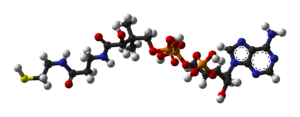Bifunctional coenzyme A synthase (CoA synthase) Function Main: Difference between revisions
HayleyThomas (talk | contribs) No edit summary |
HayleyThomas (talk | contribs) No edit summary |
||
| Line 10: | Line 10: | ||
'''Figure One: CoA Synthesis Pathway.''' Note that bifunctional CoA synthase catalyses the final two steps of this pathway.]] | '''Figure One: CoA Synthesis Pathway.''' Note that bifunctional CoA synthase catalyses the final two steps of this pathway.]] | ||
Bifunctional CoA synthase has 2 enzymatic activities. The first of these is 4’ phosphopantetheine adenylyltransferase ([[Synonyms]]). This catalyses the fourth step in the CoA synthesis pathway, joining 4’PP to ATP to give 4’ phosphopantetheine adenylyl transferase. It is encoded by the CoAD domain. The second is Dephospho-CoA kinase ([[Synonyms]]). This catalyses the final step in the CoA synthesis pathway, phosphorylating the 3’ hydroxyl group of dephospho-CoA to give CoA. It is encoded by the CoAE domain. | Bifunctional CoA synthase has 2 enzymatic activities. The first of these is 4’ phosphopantetheine adenylyltransferase ([[Synonyms]]). This catalyses the fourth step in the CoA synthesis pathway, joining 4’PP to ATP to give 4’ phosphopantetheine adenylyl transferase (see Figure Two). It is encoded by the CoAD domain. The second is Dephospho-CoA kinase ([[Synonyms]]). This catalyses the final step in the CoA synthesis pathway, phosphorylating the 3’ hydroxyl group of dephospho-CoA to give CoA (See Figure Three). It is encoded by the CoAE domain. | ||
CoA is a cofactor involved in many biological processes. These include the tricarboxylic acid (TCA) cycle, fatty acid synthesis and beta-oxidation, amino acid degredation, ACh synthesis, melatonin synthesis, heme synthesis, toxin/drug metabolism in the liver, DNA replication and cell division (by acetylating proteins) and signalling (by attaching fatty acids to proteins). Its structure is shown in Figure | [[Image:CoAD reaction.gif]] | ||
'''Figure Two: Reaction catalysed by 4' phosphopantetheine adenylyltransferase''' | |||
[[Image:CoAE reaction.gif]] | |||
'''Figure Three: Reaction catalysed by desphospho-CoA kinase''' | |||
CoA is a cofactor involved in many biological processes. These include the tricarboxylic acid (TCA) cycle, fatty acid synthesis and beta-oxidation, amino acid degredation, ACh synthesis, melatonin synthesis, heme synthesis, toxin/drug metabolism in the liver, DNA replication and cell division (by acetylating proteins) and signalling (by attaching fatty acids to proteins). Its structure is shown in Figure Four. | |||
[[Image:CoA structure 2.png]] | [[Image:CoA structure 2.png]] | ||
| Line 18: | Line 26: | ||
[[Image:CoA structure.png]] | [[Image:CoA structure.png]] | ||
'''Figure | '''Figure Four: CoA structure.''' Reproduced from Wikipedia (http://en.wikipedia.org/wiki/Coenzyme_A) | ||
Revision as of 03:10, 28 May 2007
Bifunctional coenzyme A synthase catalyses the final two steps in the pathway that synthesises CoA from pantotheic acid (Vitamin B3). This pathway is shown in Figure One below.
Figure One: CoA Synthesis Pathway. Note that bifunctional CoA synthase catalyses the final two steps of this pathway.]]
Bifunctional CoA synthase has 2 enzymatic activities. The first of these is 4’ phosphopantetheine adenylyltransferase (Synonyms). This catalyses the fourth step in the CoA synthesis pathway, joining 4’PP to ATP to give 4’ phosphopantetheine adenylyl transferase (see Figure Two). It is encoded by the CoAD domain. The second is Dephospho-CoA kinase (Synonyms). This catalyses the final step in the CoA synthesis pathway, phosphorylating the 3’ hydroxyl group of dephospho-CoA to give CoA (See Figure Three). It is encoded by the CoAE domain.
Figure Two: Reaction catalysed by 4' phosphopantetheine adenylyltransferase
Figure Three: Reaction catalysed by desphospho-CoA kinase
CoA is a cofactor involved in many biological processes. These include the tricarboxylic acid (TCA) cycle, fatty acid synthesis and beta-oxidation, amino acid degredation, ACh synthesis, melatonin synthesis, heme synthesis, toxin/drug metabolism in the liver, DNA replication and cell division (by acetylating proteins) and signalling (by attaching fatty acids to proteins). Its structure is shown in Figure Four.
Figure Four: CoA structure. Reproduced from Wikipedia (http://en.wikipedia.org/wiki/Coenzyme_A)
Lines of evidence:




